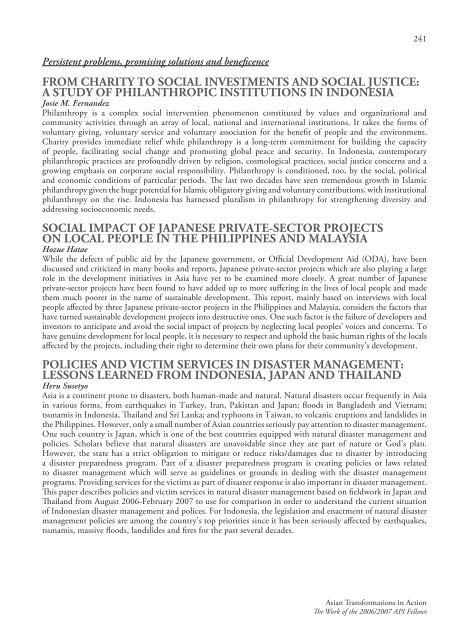Asian Transformations in Action - Api-fellowships.org
Asian Transformations in Action - Api-fellowships.org
Asian Transformations in Action - Api-fellowships.org
Create successful ePaper yourself
Turn your PDF publications into a flip-book with our unique Google optimized e-Paper software.
Persistent problems, promis<strong>in</strong>g solutions and beneficenceFROM CHARITY TO SOCIAL INVESTMENTS AND SOCIAL JUSTICE:A STUDY OF PHILANTHROPIC INSTITUTIONS IN INDONESIAJosie M. FernandezPhilanthropy is a complex social <strong>in</strong>tervention phenomenon constituted by values and <strong>org</strong>anizational andcommunity activities through an array of local, national and <strong>in</strong>ternational <strong>in</strong>stitutions. It takes the forms ofvoluntary giv<strong>in</strong>g, voluntary service and voluntary association for the benefit of people and the environment.Charity provides immediate relief while philanthropy is a long-term commitment for build<strong>in</strong>g the capacityof people, facilitat<strong>in</strong>g social change and promot<strong>in</strong>g global peace and security. In Indonesia, contemporaryphilanthropic practices are profoundly driven by religion, cosmological practices, social justice concerns and agrow<strong>in</strong>g emphasis on corporate social responsibility. Philanthropy is conditioned, too, by the social, politicaland economic conditions of particular periods. The last two decades have seen tremendous growth <strong>in</strong> Islamicphilanthropy given the huge potential for Islamic obligatory giv<strong>in</strong>g and voluntary contributions, with <strong>in</strong>stitutionalphilanthropy on the rise. Indonesia has harnessed pluralism <strong>in</strong> philanthropy for strengthen<strong>in</strong>g diversity andaddress<strong>in</strong>g socioeconomic needs.SOCIAL IMPACT OF JAPANESE PRIVATE-SECTOR PROJECTSON LOCAL PEOPLE IN THE PHILIPPINES AND MALAYSIAHozue HataeWhile the defects of public aid by the Japanese government, or Official Development Aid (ODA), have beendiscussed and criticized <strong>in</strong> many books and reports, Japanese private-sector projects which are also play<strong>in</strong>g a largerole <strong>in</strong> the development <strong>in</strong>itiatives <strong>in</strong> Asia have yet to be exam<strong>in</strong>ed more closely. A great number of Japaneseprivate-sector projects have been found to have added up to more suffer<strong>in</strong>g <strong>in</strong> the lives of local people and madethem much poorer <strong>in</strong> the name of susta<strong>in</strong>able development. This report, ma<strong>in</strong>ly based on <strong>in</strong>terviews with localpeople affected by three Japanese private-sector projects <strong>in</strong> the Philipp<strong>in</strong>es and Malaysia, considers the factors thathave turned susta<strong>in</strong>able development projects <strong>in</strong>to destructive ones. One such factor is the failure of developers and<strong>in</strong>vestors to anticipate and avoid the social impact of projects by neglect<strong>in</strong>g local peoples’ voices and concerns. Tohave genu<strong>in</strong>e development for local people, it is necessary to respect and uphold the basic human rights of the localsaffected by the projects, <strong>in</strong>clud<strong>in</strong>g their right to determ<strong>in</strong>e their own plans for their community’s development.POLICIES AND VICTIM SERVICES IN DISASTER MANAGEMENT:LESSONS LEARNED FROM INDONESIA, JAPAN AND THAILANDHeru SusetyoAsia is a cont<strong>in</strong>ent prone to disasters, both human-made and natural. Natural disasters occur frequently <strong>in</strong> Asia<strong>in</strong> various forms, from earthquakes <strong>in</strong> Turkey, Iran, Pakistan and Japan; floods <strong>in</strong> Bangladesh and Vietnam;tsunamis <strong>in</strong> Indonesia, Thailand and Sri Lanka; and typhoons <strong>in</strong> Taiwan, to volcanic eruptions and landslides <strong>in</strong>the Philipp<strong>in</strong>es. However, only a small number of <strong>Asian</strong> countries seriously pay attention to disaster management.One such country is Japan, which is one of the best countries equipped with natural disaster management andpolicies. Scholars believe that natural disasters are unavoidable s<strong>in</strong>ce they are part of nature or God’s plan.However, the state has a strict obligation to mitigate or reduce risks/damages due to disaster by <strong>in</strong>troduc<strong>in</strong>ga disaster preparedness program. Part of a disaster preparedness program is creat<strong>in</strong>g policies or laws relatedto disaster management which will serve as guidel<strong>in</strong>es or grounds <strong>in</strong> deal<strong>in</strong>g with the disaster managementprograms. Provid<strong>in</strong>g services for the victims as part of disaster response is also important <strong>in</strong> disaster management.This paper describes policies and victim services <strong>in</strong> natural disaster management based on fieldwork <strong>in</strong> Japan andThailand from August 2006-February 2007 to use for comparison <strong>in</strong> order to understand the current situationof Indonesian disaster management and polices. For Indonesia, the legislation and enactment of natural disastermanagement policies are among the country’s top priorities s<strong>in</strong>ce it has been seriously affected by earthquakes,tsunamis, massive floods, landslides and fires for the past several decades.241<strong>Asian</strong> <strong>Transformations</strong> <strong>in</strong> <strong>Action</strong>The Work of the 2006/2007 API Fellows
















